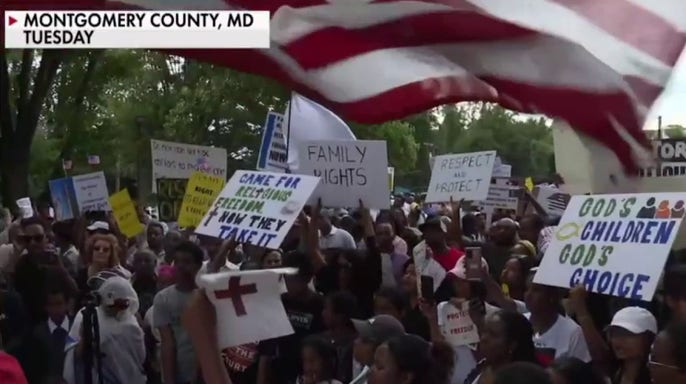Parents protest controversial school curriculum
Parents of different religious faiths, including Christians and Muslims, rallied outside the headquarters of the Montgomery County Public Schools in Maryland to show their solidarity and stand up to the district’s controversial LGBTQ curriculum.
Montgomery County Public Schools parent Dawn Iannaco-Hahn said she was excluded from an invite-only school board meeting addressing the controversial policy.
Hundreds of parents are demanding that Maryland’s largest school district allow them to opt out of classes and books that discuss topics like sexuality and gender.
Deseret News contributing writer Bethany Mandel, also a mother, argued it’s a parent’s right to tackle controversial topics, including sexuality and gender ideology, with their children on their own terms on “Fox & Friends First.”
“Some of the books were first, second, third-grade read-aloud books about transgender ideology, about sexuality,” Mandel told Carley Shimkus. “Some of the parents who spoke in favor of banning the opt-out said… ‘I’m gay, and a book didn’t make me gay and… There’s no way that your child, if you shield them in this manner, can sort of operate in the outside world,’ and that’s not what anyone is asserting.”
“No one thinks that our kids can turn gay by reading a book. What we’re asserting is that children are best learning about these sort of tricky, sticky subjects from their parents, and their parents should have a right to determine how their kids are first introduced to this,” she continued.
An MCPS policy stated that students and families “may not choose to opt out of engaging with any instructional materials, other than ‘Family Life and Human Sexuality Unit of Instruction’ which is specifically permitted by Maryland law.
As such, teachers will not send home letters to inform families when inclusive books are read in the future.”
As a result, parents in the community have banded together to advocate for more influence in their kids’ curriculum.
Allegations that the school board held the meeting with only a certain group of people could indicate it violated the Open Meetings Act, which requires “many State and local public bodies to hold their meetings in public, to give the public adequate notice of those meetings, and to allow the public to inspect meetings minutes,” the attorney general’s website reads.


Comments are closed.